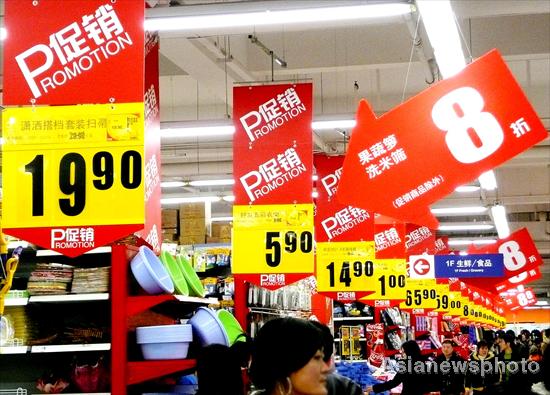China takes inflation fight to price manipulators
Updated: 2008-01-14 10:47
 |
|
Shoppers at a local supermarket adorned with sales banners in Ningbo, Zhejiang Province, January 13, 2008. The government on Sunday promulgated a revised decree to deter price hikes through hoarding or cheating. [newsphoto] |
China on Sunday took aim at price manipulators and hoarders of goods, as the government ramped up its campaign to rein in inflation which is running at its highest level in more than a decade.
The government announced a series of measures, tightening rules last adjusted in 2006, to impose tougher penalties on companies found to be driving up prices, even if they cannot be shown to have received any direct financial gain from doing so.
|
|||
They also added that industry associations themselves can be punished for breaking the rules, fined up to 500,000 yuan ($68,900) in most circumstances. Any industry association found guilty of a serious case of market manipulation could be disbanded.
The revised rules, effective from Sunday, raises the maximum fine to 1 million yuan, which almost triples the sum in the old regulations, for those who manipulate market prices and ignore the prices advised by the government under emergencies.
The State Council and local governments can set profit ratios or price ceilings for key items of goods and services when prices rise too sharp, according to the decree.
The latest moves underscored the level of concern about rising consumer prices, which jumped 6.9 percent in the year to November.
Authorities are eager to prevent large price increases in the run-up to the Lunar New Year, or Spring Festival, which falls in early February this year.
The government said last week that it would keep a freeze on energy prices and temporarily intervene in the market to brake rising prices for basic necessities.
"We will step up supervision of the prices of key life necessities and in accordance with the Price Law, temporary price intervention measures will be adopted," the cabinet said in a summary of a regular meeting chaired last Wednesday by Premier Wen Jiabao.
The cabinet said high-volume producers of daily necessities would have to obtain government approval before raising their prices.
Earlier on Sunday, Vice Finance Minister Li Yong said at a forum that Chinese policymakers will face a tough time this year battling inflation, excess liquidity and rapid investment.
The government has taken a series of steps in recent months in an effort to slow the rate of inflation, including interest rate rises, subsidies for farmers and the release of the staple meat pork from state reserves.
It has also allowed the yuan currency to appreciate more quickly, which economists say is needed to fight inflation.
"Although these policies are working well, there is a shortfall from the desired and expected effects," Li said.
|
|



